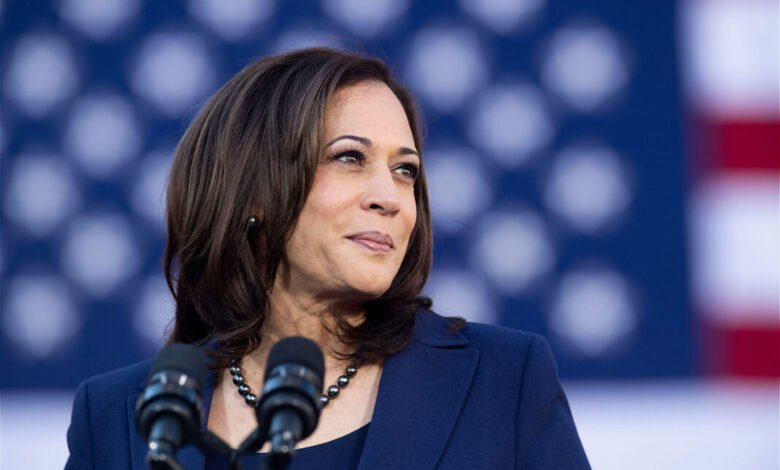Kamala Harris: Breaking Barriers and Shaping History

Kamala Devi Harris made history on January 20, 2021, when she was sworn in as the 49th Vice President of the United States. As the first woman, the first African American, and the first person of South Asian descent to hold the office, Kamala Harris rise to the vice presidency marked a monumental milestone in American history. Her journey from the daughter of immigrants to the second-highest office in the land is a powerful story of perseverance, ambition, and public service.
Early Life and Education
Kamala Harris was born on October 20, 1964, in Oakland, California, to parents who were deeply rooted in activism and education. Her mother, Shyamala Gopalan, was a breast cancer researcher from India, and her father, Donald Harris, is a Jamaican-American economist and professor. Raised in a biracial and multicultural household, Harris was exposed early to the importance of civil rights and social justice.
She attended Howard University, one of the most prestigious historically Black colleges and universities (HBCUs) in the U.S., where she majored in political science and economics. She later earned her law degree from the University of California, Hastings College of the Law.
Early Legal Career
Harris began her legal career as a deputy district attorney in Alameda County, California, known for her tough stance on gang violence, drug trafficking, and sexual abuse cases. She later moved on to serve as the chief of the San Francisco Community and Neighborhood Division in the District Attorney’s Office.
In 2003, Harris was elected as San Francisco’s District Attorney, becoming the first woman and the first African American to hold the position. Her tenure was marked by innovative reforms, including the creation of a program called “Back on Track,” which aimed to reduce recidivism by providing nonviolent offenders with job training and education.
California Attorney General
In 2010, Harris made history once again by becoming the first woman, the first African American, and the first South Asian American to be elected Attorney General of California. As the state’s top law enforcement officer, she oversaw one of the largest justice departments in the country, managing issues related to environmental protection, consumer rights, and criminal justice reform.
Harris was re-elected in 2014 with a significant majority, further solidifying her reputation as a pragmatic yet progressive leader. During her tenure, she implemented policies aimed at reducing truancy, fighting transnational crime, and holding banks accountable for fraudulent practices during the foreclosure crisis.
U.S. Senator from California
In 2016, Kamala Harris was elected to the United States Senate, succeeding long-time Senator Barbara Boxer. In doing so, she became the second African American woman and the first South Asian American to serve in the U.S. Senate. Her tenure as senator was marked by her fierce and incisive questioning in high-profile hearings, including those involving Supreme Court nominees and former Trump administration officials.
As a senator, Harris focused on issues such as healthcare reform, immigration, criminal justice, and women’s rights. She introduced legislation to protect the legal rights of refugees and immigrants, address maternal mortality among Black women, and expand access to mental health care.
2020 Presidential Campaign
In January 2019, Harris announced her candidacy for President of the United States, launching her campaign with a rally in Oakland that drew over 20,000 supporters. Her campaign emphasized unity, racial justice, and economic equality. While she initially gained traction, particularly after a strong debate performance where she challenged Joe Biden on his past record regarding segregation, her campaign eventually struggled with funding and messaging. She dropped out of the race in December 2019.
Despite ending her presidential campaign early, Harris remained a prominent national figure and a popular pick for various leadership roles within the Democratic Party.
Vice President of the United States
In August 2020, Democratic presidential nominee Joe Biden announced Kamala Harris as his running mate. The decision was historic and widely praised, as Harris brought experience, diversity, and energy to the campaign. The Biden-Harris ticket went on to defeat incumbent President Donald Trump and Vice President Mike Pence in the 2020 election, winning both the electoral college and the popular vote.
On January 20, 2021, Kamala Harris was sworn in as Vice President of the United States, shattering one of the highest glass ceilings in American politics.
Role and Impact as Vice President
As Vice President, Harris has taken on a range of responsibilities, including addressing the root causes of migration from Central America, advocating for voting rights, and leading efforts on reproductive healthcare access. She has traveled extensively both within the U.S. and internationally, meeting with world leaders, supporting diplomatic efforts, and promoting American values abroad.
Harris has also served as a tie-breaking vote in the U.S. Senate, helping to advance key parts of President Biden’s legislative agenda, including the American Rescue Plan and the Inflation Reduction Act. Her role has been especially pivotal in a sharply divided Congress.
Representation and Legacy
Kamala Harris ascent to the vice presidency has inspired millions of people around the world, especially women and people of color who see their own experiences reflected in her journey. She often speaks of the importance of representation and the power of being the “first” but not the “last.”
Harris’s story underscores the importance of opportunity, education, and civic engagement. By rising through the ranks of American politics, she has redefined what leadership looks like and demonstrated that diversity in government leads to broader perspectives and more inclusive policymaking.
Challenges and Criticism
Like any high-profile political figure, Kamala Harris has faced her share of criticism. Some critics have pointed to her record as a prosecutor, arguing that it sometimes contradicted her progressive rhetoric. Others have questioned her visibility and effectiveness as Vice President.
However, Harris continues to navigate the complex landscape of American politics with resilience. Her supporters argue that she is laying a foundation for future leadership and helping to redefine the role of the Vice President in the 21st century.
Looking Ahead
As the 2024 election cycle begins to unfold, Kamala Harris remains a central figure in the Democratic Party. Her name frequently appears in discussions about the future leadership of the country, and many view her as a strong contender for the presidency should she choose to run in the future.
Regardless of what lies ahead, Kamala Harris has already secured her place in history. Her career is a testament to the possibilities of American democracy and the enduring power of hope, determination, and trailblazing leadership.




